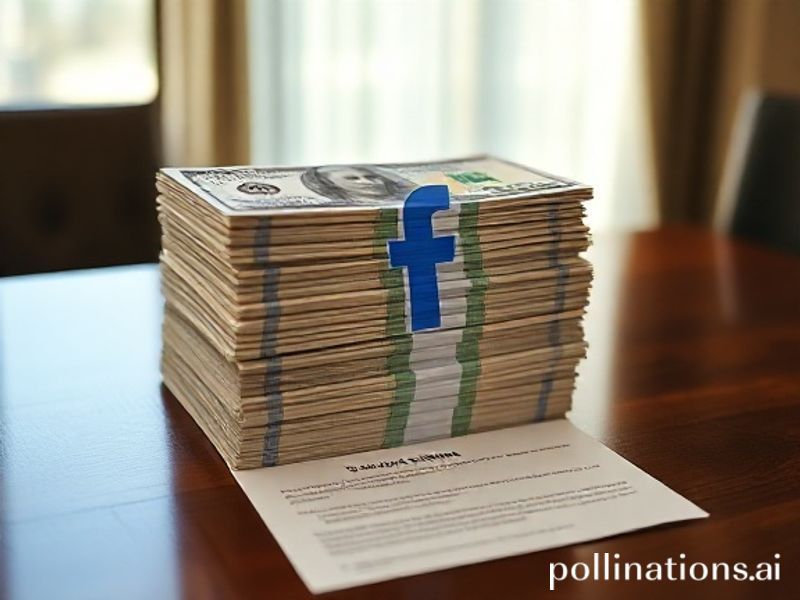Meta’s $725M Privacy Payout: A Global Receipt for 15 Years of Oversharing
Facebook’s $725 Million Global Apology Coupon: One Click to Settle All Regrets
By Our Correspondent, currently hiding the location data on his phone
The press release hit inboxes at 3:14 a.m. GMT—because nothing says “we take privacy seriously” like a midnight confession. Meta, corporate parent of Facebook, Instagram, and humanity’s collective diary, has agreed to pay $725 million to settle a class action that accused the platform of cheerfully handing user data to Cambridge Analytica the way an over-served host passes out party favors. The sum sounds biblical until you remember that Meta’s quarterly ad revenue could bankroll several small nations and still have change for a rocket-shaped vanity project.
Overseas, reactions oscillated between a Gallic shrug and a Korean eye-roll. In Brussels, officials cracked open their third espresso of the morning and muttered that, compared with the EU’s GDPR fines, $725 million is what you tip the valet. Meanwhile, in Nairobi, digital-rights advocates calculated that the payout could fund Kenya’s entire data-protection authority for 40 years—assuming anyone remembers to wire the money before the next election cycle. Australians simply asked if the settlement would finally stop their uncles from sharing cryptic Minion memes. (Spoiler: no.)
The mechanics of the settlement are a masterpiece of bureaucratic origami. Any Facebook user in the United States between May 2007 and December 2022 is eligible to claim a piece of the pie, provided they can prove they were alive and clicking during that 15-year window. Payouts are rumored to hover around $30 each, roughly the price of a mediocre airport sandwich—fitting, since the entire affair is a lukewarm ham-and-cheese apology.
Internationally, the settlement radiates like a half-hearted mea culpa broadcast on shortwave radio. The suit only covers U.S. residents, leaving the other 190-odd countries to nurse their grievances with the quiet dignity of people who realize they were just the unpaid extras in Silicon Valley’s psychographic passion play. Brazilian lawmakers, still sore from WhatsApp’s role in their last election, sniffed that Meta’s “global community” apparently stops at the Rio Grande. The Indian Ministry of Electronics expressed “concern,” which in diplomatic terms translates to “please hold while we draft a new tax.”
And yet the deal matters, if only as a morality tale told in PowerPoint. It confirms that personal data is the new oil—except when it spills, nobody calls Greenpeace; they call a class-action attorney. The settlement also establishes a convenient price list for future privacy transgressions: roughly 88 cents per affected soul, less than the cost of a single Facebook ad click hawking brain supplements to insomniac dads in Ohio. One can imagine a future board meeting: “What’s the downside of another leak?” “Oh, about three Super Bowl ads and a round of layoffs in the ethics department.”
There is, of course, the ritual promise of structural reform. Meta vows to “further formalize” its privacy controls, a phrase so nebulous it could mean end-to-end encryption or simply a second lock on the fridge where they keep the algorithms. Skeptics note that the company’s last “pivot to privacy” coincided with the launch of Ray-Ban smart glasses that can record strangers without blinking. If irony were carbon, we’d have already burned the planet twice.
What happens to the money is the subplot that keeps accountants awake at night. After lawyers skim their customary third, and after the claims administrator finishes mailing checks to deceased users who somehow still post birthday reminders, whatever remains will be distributed among the living. Some recipients will donate to digital-rights NGOs; others will spend it on targeted ads for yoga retreats. Circle of life.
In the end, the settlement serves as a global reminder that when the product is free, the real currency is shame—ours for clicking “agree,” theirs for pretending surprise when the bill arrives. The international takeaway? If you want privacy, move to a cave. If you want likes, stay online. And if you want justice, well, there’s a $30 coupon for that.







